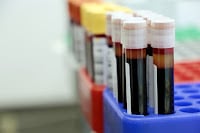Biomarker May Predict Patient Response to Antidepressants

Researchers have identified a biomarker that may be capable of predicting within one week whether patients with major depressive disorder (MDD) will respond to antidepressants. The findings were published yesterday in Molecular Psychiatry.
For the small pilot study, Steven Targum, M.D., of Signant Health in Boston, Mark Rasenick, Ph.D., of the University of Illinois College of Medicine in Chicago, and colleagues analyzed how antidepressants impact the protein Gs alpha, which allows neurotransmitters to make the molecule adenylyl cyclase. Previous research has shown that adenylyl cyclase is low in patients with MDD because Gs alpha is predominantly stuck in membranes called lipid rafts. Antidepressants may be able to move Gs alpha out of those rafts, the authors wrote.
Targum, Rasenick, and colleagues analyzed data from a study at the Emory University School of Medicine involving 49 participants with MDD and no psychosis and 59 controls with no history of MDD; participants ranged in age from 30 to 64 years. They were screened using the 17-item Hamilton Rating Scale for Depression (HAM-D) and completed at least two visits with researchers, scheduled one week apart, at which blood draws occurred to assess Gs alpha.
Nineteen of the participants with MDD went on to complete six weeks of treatment with antidepressants. Blood was drawn from these participants a third time six weeks after initiating medication treatment. Eleven participants responded to the antidepressants (defined as ≥50% improvement on HAM-D score) after six weeks.
Analysis of the blood draws revealed that during the initial screening visit, participants with MDD had significantly lower adenylyl cyclase activity compared with healthy controls. At the third visit, participants who responded to their antidepressant treatment experienced significant increases in adenylyl cyclase compared with those who did not respond to the medications.
“What we have developed is a test that can not only indicate the presence of depression but … also indicate therapeutic response with a single biomarker, and that is something that has not existed to date,” Rasenick said in a University of Illinois at Chicago news release.
According to the release, the biomarker blood test could indicate if Gs alpha is out of the lipid raft within one week. “Because platelets turn over in one week, you would see a change in people who were going to get better,” Rasenick said.
For related information, see the Psychiatric News article “Blood May Hold Secret to Biomarkers for Depression.”
(Image: iStock/Oleg Elkov)
Don't miss out! To learn about newly posted articles in Psychiatric News, please sign up here.






